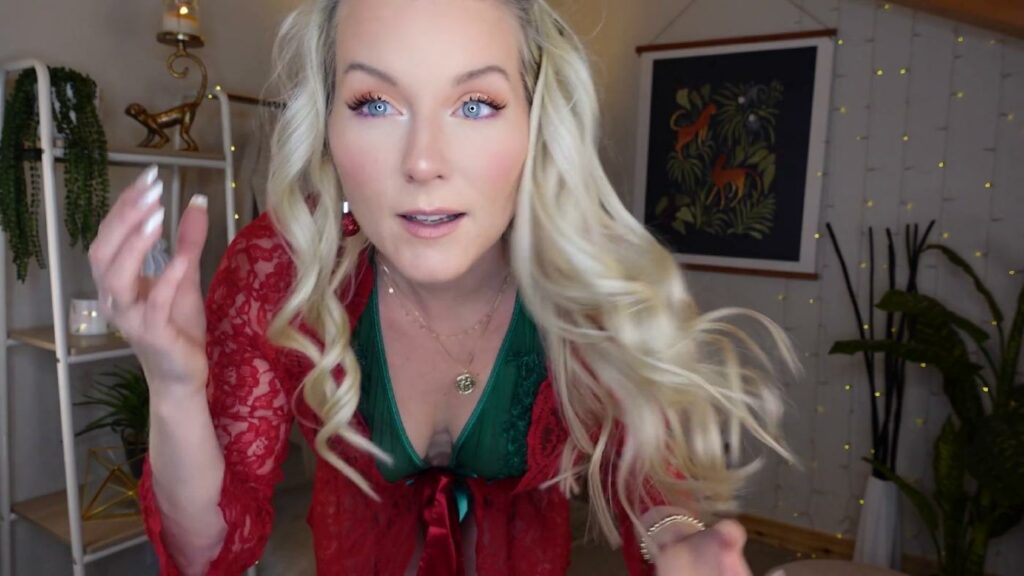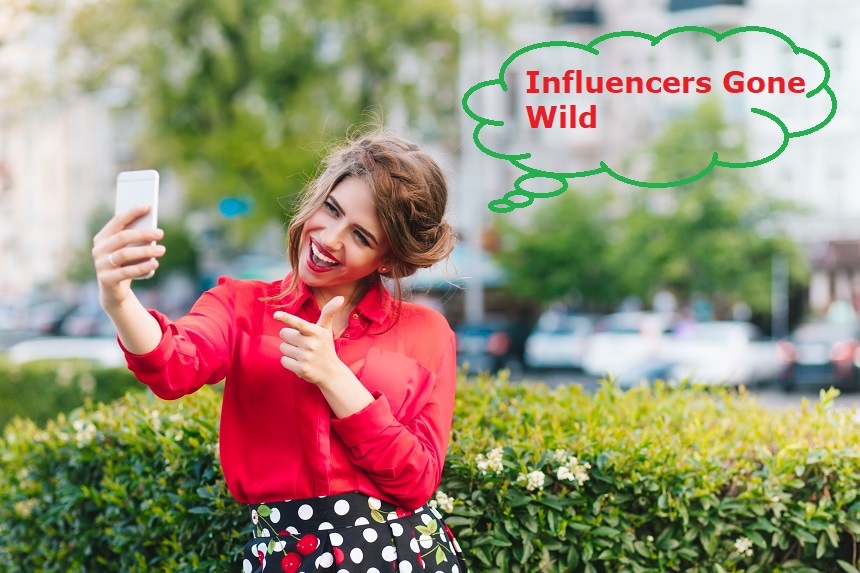Have you ever wondered what happens when influencers go wild?
Influencers gone wild is a term used to describe the phenomenon of influencers engaging in outrageous or controversial behavior. This can include anything from posting sexually suggestive photos to making offensive comments. While some influencers may simply be trying to get attention, others may be genuinely struggling with mental health issues.
Whatever the reason, influencers gone wild can have a negative impact on their followers. Young people who look up to influencers may be more likely to engage in risky behavior themselves. Additionally, influencers gone wild can damage the reputation of the influencer marketing industry as a whole.
Read also:Meet Vanessa Marcil Actress Advocate And Inspiration
Here are some examples of influencers gone wild:
| Name | Behavior |
|---|---|
| Logan Paul | Posted a video of a dead body in Japan's Aokigahara Forest |
| Jake Paul | Threw a party during the COVID-19 pandemic |
| Trisha Paytas | Made offensive comments about transgender people |
It is important to remember that influencers are not perfect. They are human beings who are just as capable of making mistakes as anyone else. However, when influencers engage in outrageous or controversial behavior, it is important to hold them accountable. We should not condone their behavior or give them a platform to spread their harmful messages.
Influencers Gone Wild
In the realm of social media, the term "influencers gone wild" has become a prevalent topic, encompassing a wide range of behaviors and consequences. Here are six key aspects that shed light on this phenomenon:
- Attention-Seeking: Influencers may engage in outrageous behavior to garner attention and increase their following.
- Mental Health: Underlying mental health issues can contribute to impulsive and controversial actions by influencers.
- Negative Influence: Influencers gone wild can negatively impact their followers, particularly young and impressionable individuals.
- Reputation Damage: Outrageous behavior can tarnish the reputation of both the influencer and the influencer marketing industry.
- Accountability: Influencers should be held accountable for their actions and not be given a platform to spread harmful messages.
- Ethical Boundaries: Influencers gone wild often cross ethical boundaries, such as posting inappropriate content or promoting dangerous products.
These key aspects highlight the complex and multifaceted nature of influencers gone wild. Understanding these aspects is crucial for addressing the issue effectively and promoting responsible behavior within the influencer community. By holding influencers accountable, raising awareness about mental health, and fostering ethical guidelines, we can mitigate the negative consequences and harness the positive potential of influencer marketing.
1. Attention-Seeking
Attention-seeking behavior is a key component of "influencers gone wild." Influencers may resort to outrageous or controversial actions to attract attention and increase their following. This behavior can manifest in various forms, such as posting provocative or revealing photos, making inflammatory or offensive comments, or engaging in stunts that push the boundaries of social norms.
The desire for attention can be driven by a range of factors, including a need for validation, a thirst for fame, or a to stand out from the crowd. Influencers who engage in attention-seeking behavior often have a fragile sense of self-worth and may rely on external validation to boost their self-esteem.
Read also:The Horrific Injuries Sustained By Baby Jessica A Tragic Tale
While attention-seeking behavior can be effective in increasing an influencer's following in the short term, it can also have negative consequences. Influencers who engage in outrageous behavior may damage their reputation, alienate their audience, and attract criticism from the media and the public. Additionally, attention-seeking behavior can set a negative example for young and impressionable followers, who may be more likely to engage in risky or inappropriate behavior to gain attention themselves.
It is important to note that not all influencers who engage in attention-seeking behavior are necessarily "gone wild." Some influencers may simply be trying to find their voice or experiment with different content formats. However, when attention-seeking behavior becomes extreme or harmful, it is important to hold influencers accountable and discourage them from engaging in such behavior.
2. Mental Health
Mental health issues can play a significant role in the impulsive and controversial actions of influencers. Influencers, like any other individuals, are susceptible to mental health challenges that can affect their decision-making and behavior.
- Anxiety and Depression: Anxiety and depression can lead to feelings of hopelessness, worthlessness, and irritability, which may manifest in impulsive or reckless behavior as a way to cope with these emotions.
- Bipolar Disorder: Bipolar disorder is characterized by alternating periods of mania and depression. During manic episodes, influencers may experience inflated self-esteem, decreased need for sleep, and impulsive decision-making, which can lead to controversial or inappropriate behavior.
- Personality Disorders: Personality disorders, such as narcissistic personality disorder or borderline personality disorder, can contribute to a lack of empathy, poor impulse control, and a need for attention, which can drive influencers to engage in outrageous or attention-seeking behavior.
- Substance Abuse: Substance abuse can impair judgment and decision-making, making influencers more likely to engage in risky or controversial behavior while under the influence of drugs or alcohol.
It is important to note that not all influencers who experience mental health issues will necessarily engage in "gone wild" behavior. However, underlying mental health issues can increase the risk of impulsive and controversial actions, especially when combined with other factors such as pressure to maintain a certain image or the desire for attention.
3. Negative Influence
The actions of influencers gone wild can have a profound negative impact on their followers, especially young and impressionable individuals. Here are four key facets to consider:
- Role Modeling: Influencers serve as role models for their followers, and when they engage in outrageous or controversial behavior, they send a message that such behavior is acceptable or even desirable. This can lead young followers to emulate the influencer's behavior, even if it is harmful or inappropriate.
- Trust and Credibility: When influencers engage in "gone wild" behavior, they damage their trust and credibility with their followers. This can make it difficult for them to promote products or services effectively, as their followers may no longer trust their recommendations or advice.
- Mental Health: The constant pressure to maintain a certain image and the exposure to negative comments and criticism can take a toll on influencers' mental health. This can lead to anxiety, depression, and other mental health issues, which can further impact their behavior and negatively influence their followers.
- Vulnerability: Young and impressionable individuals are particularly vulnerable to the negative influence of influencers gone wild. They may not have the critical thinking skills or life experience to recognize and reject inappropriate or harmful behavior. This can make them more likely to adopt the influencer's values and behaviors, even if they are not in their best interests.
In conclusion, the negative influence of influencers gone wild on their followers, particularly young and impressionable individuals, cannot be overstated. It is important for influencers to be aware of their responsibility and to use their platform for good. They should also be held accountable for their actions and not be given a platform to spread harmful messages.
4. Reputation Damage
The outrageous behavior of influencers gone wild can have severe consequences for both the individual influencer and the influencer marketing industry as a whole. Here are four key facets to consider:
- Loss of Trust and Credibility: When influencers engage in outrageous behavior, they damage their trust and credibility with their followers. This can make it difficult for them to promote products or services effectively, as their followers may no longer trust their recommendations or advice.
- Negative Publicity: The outrageous behavior of influencers gone wild can generate negative publicity for both the influencer and the brands they work with. This can lead to a loss of followers, sponsorships, and revenue.
- Damage to the Influencer Marketing Industry: The actions of influencers gone wild can damage the reputation of the influencer marketing industry as a whole. This can make it more difficult for legitimate influencers to secure partnerships and collaborations.
- Legal Consequences: In some cases, the outrageous behavior of influencers gone wild may result in legal consequences. This could include charges such as defamation, fraud, or inciting violence.
In conclusion, the outrageous behavior of influencers gone wild can have serious consequences for both the individual influencer and the influencer marketing industry as a whole. It is important for influencers to be aware of their responsibility and to use their platform for good.
5. Accountability
The outrageous behavior of "influencers gone wild" highlights the importance of accountability in the influencer marketing industry. Influencers have a responsibility to use their platform for good and to avoid spreading harmful messages. When influencers engage in inappropriate or dangerous behavior, they should be held accountable and not given a platform to spread their harmful messages.
There are several reasons why accountability is important in the influencer marketing industry.
Protecting the public: Influencers have a large following and their actions can have a significant impact on their followers. When influencers engage in dangerous or inappropriate behavior, they put their followers at risk.
Maintaining the reputation of the influencer marketing industry: The actions of a few bad apples can damage the reputation of the entire influencer marketing industry. When influencers are held accountable for their actions, it helps to protect the reputation of the industry and ensure that brands can continue to partner with influencers with confidence.
Setting an example for others: When influencers are held accountable for their actions, it sends a message that this type of behavior is not acceptable. This can help to deter other influencers from engaging in similar behavior.
There are a number of ways to hold influencers accountable for their actions. One way is to hold them financially accountable. For example, brands can cancel contracts with influencers who engage in inappropriate behavior. Another way to hold influencers accountable is to hold them publicly accountable. For example, the media can report on the inappropriate behavior of influencers and the public can voice their disapproval on social media.
Accountability is an essential component of "influencers gone wild." It is important to hold influencers accountable for their actions and to not give them a platform to spread harmful messages. By doing so, we can protect the public, maintain the reputation of the influencer marketing industry, and set an example for others.
6. Ethical Boundaries
The phenomenon of "influencers gone wild" often involves the crossing of ethical boundaries, as influencers engage in behavior that is inappropriate, harmful, or even dangerous. This can manifest in various ways, including posting sexually suggestive or violent content, promoting products that are known to be unsafe or ineffective, or engaging in other behaviors that violate societal norms or legal standards.
- Posting Inappropriate Content: Influencers may post content that is sexually suggestive, violent, or otherwise inappropriate for their audience. This can include posting revealing photos or videos, making sexually explicit comments, or engaging in other behaviors that could be harmful to their followers.
- Promoting Dangerous Products: Influencers may promote products that are known to be unsafe or ineffective. This can include promoting dietary supplements that make false or exaggerated claims, promoting dangerous beauty products, or promoting other products that could pose a risk to consumers.
- Violating Privacy: Influencers may violate the privacy of others by posting personal information or photos without their consent. This can include posting photos or videos of people in compromising positions, sharing private conversations, or otherwise violating their privacy.
- Engaging in Hate Speech: Influencers may engage in hate speech or other forms of discrimination. This can include making racist, sexist, homophobic, or other discriminatory comments or using other language that is intended to incite hatred or violence.
The crossing of ethical boundaries by influencers gone wild can have serious consequences. It can harm their followers, damage their reputation, and erode public trust in the influencer marketing industry. It is important for influencers to be aware of their ethical responsibilities and to avoid engaging in behavior that could cross ethical boundaries.
FAQs on "Influencers Gone Wild"
This section addresses frequently asked questions and common misconceptions surrounding the phenomenon of "influencers gone wild."
Question 1: What is meant by "influencers gone wild"?
The term "influencers gone wild" refers to the behavior of influencers who engage in outrageous, controversial, or harmful actions. This can include posting inappropriate content, promoting dangerous products, violating privacy, or engaging in hate speech.
Question 2: Why do influencers engage in "gone wild" behavior?
There are several reasons why influencers may engage in "gone wild" behavior, including attention-seeking, mental health issues, a desire for fame, or a lack of ethical boundaries.
Question 3: What are the consequences of "influencers gone wild" behavior?
The consequences of "influencers gone wild" behavior can be severe, including damage to their reputation, loss of followers and sponsorships, and legal consequences.
Question 4: How can we hold influencers accountable for their actions?
There are several ways to hold influencers accountable for their actions, including holding them financially accountable, holding them publicly accountable, and setting an example for others.
Question 5: What is the role of social media platforms in addressing "influencers gone wild" behavior?
Social media platforms have a responsibility to address "influencers gone wild" behavior by enforcing their community guidelines, removing inappropriate content, and working with influencers to promote responsible behavior.
Summary: The phenomenon of "influencers gone wild" highlights the importance of ethical behavior and accountability in the influencer marketing industry. It is crucial for influencers to be aware of their responsibilities and to use their platform for good. Social media platforms also have a role to play in addressing inappropriate behavior and promoting a positive and responsible influencer community.
Transition to the next article section: Understanding the complexities of "influencers gone wild" behavior is essential for mitigating its negative consequences and fostering a healthy and ethical influencer marketing ecosystem.
Conclusion
The phenomenon of "influencers gone wild" has raised important questions about the responsibilities and ethical boundaries of individuals who wield significant influence over their followers. This article has explored the various facets of this issue, examining the motivations behind such behavior, its negative consequences, and the need for accountability.
It is clear that influencers have a profound impact on their followers, particularly young and impressionable individuals. Therefore, it is crucial for influencers to use their platform responsibly and to avoid engaging in behavior that could harm their followers or damage the reputation of the influencer marketing industry as a whole. Social media platforms also have a responsibility to address inappropriate behavior and to promote a positive and responsible influencer community.
Holding influencers accountable for their actions is essential for mitigating the negative consequences of "influencers gone wild" behavior. This can be achieved through a combination of financial accountability, public accountability, and setting an example for others. By doing so, we can create a more ethical and responsible influencer marketing ecosystem that benefits both influencers and their followers.


